CM's henchman in
his own trap !
 N D Sharma
N D Sharma
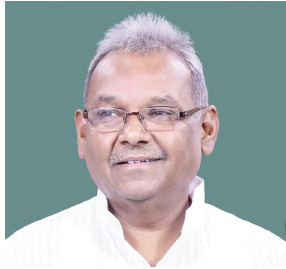 Anoop Mishra
The importance of Narottam
Mishra in the political life of
Madhya Pradesh Chief
Minister Shivraj Singh
Chouhan can be gauged
from the fact that the Chief
Minister had not removed him from
cabinet even a month after the
Election Commission found Mishra
guilty of grievous electoral offences
and disqualified him with the
immediate effect to be a member of
the Assembly as well as debarred him
from contesting elections for three
years.
Anoop Mishra
The importance of Narottam
Mishra in the political life of
Madhya Pradesh Chief
Minister Shivraj Singh
Chouhan can be gauged
from the fact that the Chief
Minister had not removed him from
cabinet even a month after the
Election Commission found Mishra
guilty of grievous electoral offences
and disqualified him with the
immediate effect to be a member of
the Assembly as well as debarred him
from contesting elections for three
years.
Removal from cabinet, though, was
a mere technical formality because
Mishra had, for all practical purposes,
ceased to hold all the positions which
he was holding by virtue of being MLA
the moment he was disqualified.
Chouhan had hardly taken any time
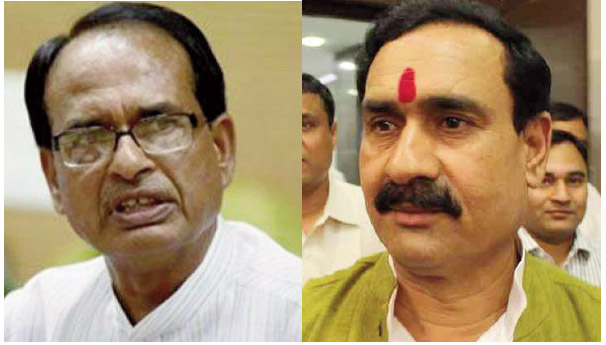 Shivraj Singh Chouhan and Narottam Mishra
in seeking resignations of ministers
accused of much lesser crimes. For
instance, Minister of Health and Family
Welfare and Medical Education Anoop
Mishra was made to resign in 2010 soon after his name had figured in a
complaint made against some of his
family members for the murder of a
youth. Another Minister of Health and
Family Welfare Ajay Vishnoi had to
resign when the Lokayukta police
raided the residences of Director of
Health Services and the trail led to
some of Vishnoi's relatives. They were easily dispensable.
Shivraj Singh Chouhan and Narottam Mishra
in seeking resignations of ministers
accused of much lesser crimes. For
instance, Minister of Health and Family
Welfare and Medical Education Anoop
Mishra was made to resign in 2010 soon after his name had figured in a
complaint made against some of his
family members for the murder of a
youth. Another Minister of Health and
Family Welfare Ajay Vishnoi had to
resign when the Lokayukta police
raided the residences of Director of
Health Services and the trail led to
some of Vishnoi's relatives. They were easily dispensable.
Not so Narottam Mishra who, with
portfolios of Public Relations and
Legislative Affairs as well as Water
Resources, has taken care of
Chouhan's problems born out of his
extra-curricular actions – and also
managed manipulations adroitly. The
opposition Congress had, for instance,
moved in the Assembly a noconfidence
motion against the
Chouhan Government, replete with
hard facts aimed at rattling the
Government.
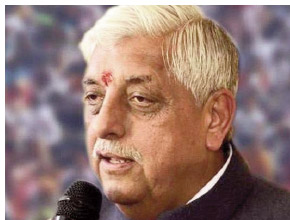 Ajay Vishnoi
As the debate was to start at the
appointed time, the first speaker (of
course, a Congress leader) opposed
the motion while expressing
confidence in the Chouhan
government. Amidst the turmoil that
followed, Narottam Mishra, in his
capacity as Minister of Legislative
Affairs, moved a motion for
adjournment of the House sine die
and the obliging Speaker promptly did
that. All within minutes before the
Congress members could understand what was happening.
On another occasion, when two
Congress members had vociferously
raised farmers' issues and the
Government was finding it difficult to
come with satisfactory replies, Mishra
moved a motion for terminating the
membership of the two members for
bringing disgrace to the House by their
unruly behaviour and the Speaker
promptly did it. The communication
was also sent to the Election
Commission. It was all in violation of
the Rules of the Assembly. As the two
members were approaching the High
Court at Jabalpur, Mishra persuaded
them to return to the House. Again on
Mishra's motion, the Speaker restored
their membership nine days later. This
must be a rare instance of mockery of
the Constitution, the electoral law and
the Assembly Rules.
Ajay Vishnoi
As the debate was to start at the
appointed time, the first speaker (of
course, a Congress leader) opposed
the motion while expressing
confidence in the Chouhan
government. Amidst the turmoil that
followed, Narottam Mishra, in his
capacity as Minister of Legislative
Affairs, moved a motion for
adjournment of the House sine die
and the obliging Speaker promptly did
that. All within minutes before the
Congress members could understand what was happening.
On another occasion, when two
Congress members had vociferously
raised farmers' issues and the
Government was finding it difficult to
come with satisfactory replies, Mishra
moved a motion for terminating the
membership of the two members for
bringing disgrace to the House by their
unruly behaviour and the Speaker
promptly did it. The communication
was also sent to the Election
Commission. It was all in violation of
the Rules of the Assembly. As the two
members were approaching the High
Court at Jabalpur, Mishra persuaded
them to return to the House. Again on
Mishra's motion, the Speaker restored
their membership nine days later. This
must be a rare instance of mockery of
the Constitution, the electoral law and
the Assembly Rules.
Mishra's 'skill' is equally
visible in the
management of media.
The media organisations
in the State by and large
'self-censor' the news
that is likely to harm the
interests of Chouhan or
his family members.
Thus the deliberate
trampling down of an
upright IPS officer by a
dumper transporting
illegally mined stones
becomes an accident.
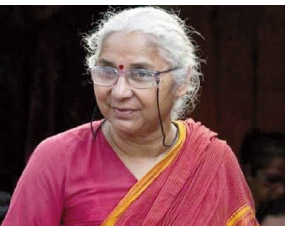 Medha Patkar
Mishra's 'skill' is equally visible in the
management of media. The media
organisations in the State ,by and
large, 'self-censor' the news that is
likely to harm the interests of Chouhan
or his family members. Thus the
deliberate trampling down of an
upright IPS officer by a dumper
transporting illegally mined stones
becomes an accident. The State High
Court appoints, on the direction of
Supreme Court, a judicial commission
which finds that thousands of families displaced by Sardar Sarovar Dam did
not even know that the compensation
in their names had been paid by the
Government and, in some cases, even
lands had been allotted to them.
Following the efforts of Medha
Patkar, on whose petition the Supreme
Court had given the direction, the
Judicial Commission's report is tabled
in the Assembly but for the media in
the State the findings were not worth
reporting. So is the case with nearly a
dozen reports of judicial commissions
appointed by Chouhan like about the
Petlawad blast where over a hundred persons were killed or the reports of
Judicial Commissions which inquired
the two Ratangarh temple stampedes.
Medha Patkar
Mishra's 'skill' is equally visible in the
management of media. The media
organisations in the State ,by and
large, 'self-censor' the news that is
likely to harm the interests of Chouhan
or his family members. Thus the
deliberate trampling down of an
upright IPS officer by a dumper
transporting illegally mined stones
becomes an accident. The State High
Court appoints, on the direction of
Supreme Court, a judicial commission
which finds that thousands of families displaced by Sardar Sarovar Dam did
not even know that the compensation
in their names had been paid by the
Government and, in some cases, even
lands had been allotted to them.
Following the efforts of Medha
Patkar, on whose petition the Supreme
Court had given the direction, the
Judicial Commission's report is tabled
in the Assembly but for the media in
the State the findings were not worth
reporting. So is the case with nearly a
dozen reports of judicial commissions
appointed by Chouhan like about the
Petlawad blast where over a hundred persons were killed or the reports of
Judicial Commissions which inquired
the two Ratangarh temple stampedes.
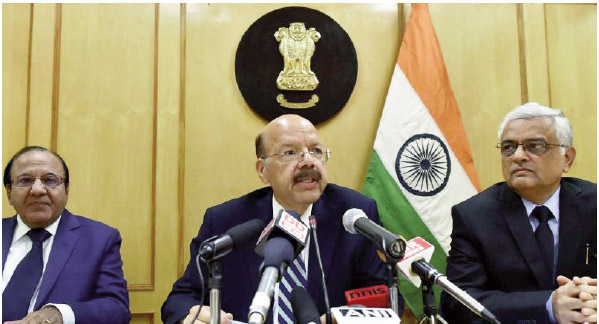 Chief Election Commissioner Nasim Zaidi along with Election
Commissioners O P Rawat (R) and A K Joti
It was this media management
which eventually did Mishra in. His media management in his own favour
during Assembly elections in 2008 was
too glaring to be overlooked by
Election Commission (EC). The committee set up by EC had concluded
that 42 news items appearing in
favour of Mishra constituted "paid
news" or advertisements.
The EC said the first issue was
'whether the news articles, 'appeals'
with photograph of the respondent,
advertisements etc. in various
newspapers namely, Dainik Bhaskar,
Nai Duniya, Dainik Datia Prakash,
Acharan Gwalior and BPN Times,
published during the election process
in Datia constituency (where Mishra
was a candidate), amount to 'paid
news'/advertisements in connection
with the election of the respondent?'
While a direct appeal, titled
'Vinamra Agrah' was published in
Dainik Bhaskar on November 27, 2008
with a photograph of Mishra and
Chouhan appearing along with BJP's
party symbol, a slogan written at its
bottom read 'Datia say uthi aawaz –
abki Narottam phir Shivraj (The voice
from Datia says Narottam this time,
then Shivraj)'. Dainik Datia Prakash
published an appeal to the electors,
titled 'Matdata bandhuon say namra
nivedan(A polite appeal to the voters)',
along with Mishra's photograph and
party symbol, which left nothing to the
imagination on whom it intended to
favour and why. In its 69-page decision of June 23,
the EC report includes a list of the
stories that appeared in these papers –
with headlines that sound unlike any news report. Here's a sample: 'Kshetra
ke vikas ke liye Narottam Mishra ki
jeet zaroori (Narottam Mishra's
victory is necessary for the
development of the region)', 'Datia ka
vikas Narottam ke haath (The
progress of Datia is in Narottam's
hands)'; 'Rozgar ka sapna pura
karenge Narottam (Narottam will
fulfil our livelihood dreams)'; 'Sabke dil
par chaa gaye Narottam (Narottam
has won everyone's hearts)'; the list
goes on and on. The EC report goes on
Chief Election Commissioner Nasim Zaidi along with Election
Commissioners O P Rawat (R) and A K Joti
It was this media management
which eventually did Mishra in. His media management in his own favour
during Assembly elections in 2008 was
too glaring to be overlooked by
Election Commission (EC). The committee set up by EC had concluded
that 42 news items appearing in
favour of Mishra constituted "paid
news" or advertisements.
The EC said the first issue was
'whether the news articles, 'appeals'
with photograph of the respondent,
advertisements etc. in various
newspapers namely, Dainik Bhaskar,
Nai Duniya, Dainik Datia Prakash,
Acharan Gwalior and BPN Times,
published during the election process
in Datia constituency (where Mishra
was a candidate), amount to 'paid
news'/advertisements in connection
with the election of the respondent?'
While a direct appeal, titled
'Vinamra Agrah' was published in
Dainik Bhaskar on November 27, 2008
with a photograph of Mishra and
Chouhan appearing along with BJP's
party symbol, a slogan written at its
bottom read 'Datia say uthi aawaz –
abki Narottam phir Shivraj (The voice
from Datia says Narottam this time,
then Shivraj)'. Dainik Datia Prakash
published an appeal to the electors,
titled 'Matdata bandhuon say namra
nivedan(A polite appeal to the voters)',
along with Mishra's photograph and
party symbol, which left nothing to the
imagination on whom it intended to
favour and why. In its 69-page decision of June 23,
the EC report includes a list of the
stories that appeared in these papers –
with headlines that sound unlike any news report. Here's a sample: 'Kshetra
ke vikas ke liye Narottam Mishra ki
jeet zaroori (Narottam Mishra's
victory is necessary for the
development of the region)', 'Datia ka
vikas Narottam ke haath (The
progress of Datia is in Narottam's
hands)'; 'Rozgar ka sapna pura
karenge Narottam (Narottam will
fulfil our livelihood dreams)'; 'Sabke dil
par chaa gaye Narottam (Narottam
has won everyone's hearts)'; the list
goes on and on. The EC report goes on
Rajendra Bharti, who
had lost to Mishra in the
2008 Assembly elections
and was the complainant
to the Election
Commission about
Mishra's 'paid news'
activities, smelt a rat and
moved the Supreme
Court and got Mishra's
petition transferred
from Madhya Pradesh
High Court to Delhi High
Court where a single
bench refused to grant
stay to Mishra.
to document how identical reports
with the identical headlines were
published in multiple editions of big
newspapers. The decision was taken
unanimously by EC comprising (then)
Chief Election Commissioner Nasim
Zaidi and Election Commissioners A K
Joti and O P Rawat.
The EC decision said the committee
arrived at its conclusions on the basis
of the "timing of the publications,
content specifically carried in the
publications, the repetition of content
from one newspaper to another on
successive dates of publication,
headliners of the news items which
heavily promoted the respondent in
particular, and most importantly,
publication of the item without the
mention of any reporter's name."
The EC said, 'These observations
made by the committee support the
conclusion that the said news items
were indeed paid news; 'all 42 paid
news items are extremely biased in
favour of the respondent. Many of
these are printed 'impact features'
which are typically paid for on prenegotiated
terms according to the
prevailing advertorial policy of the
concerned newspaper.' The EC added
that all the items 'identify strongly with
the illustrations contained in the
Commission's compendium on paid
news.'
The EC held Mishra guilty of an
offence under Section 171H of the
Indian Penal Code, 1860 for issuing
'direct appeals' which appeared in his
name, containing his photograph, and
were published on the day of the poll,
November 27, 2008. In his account of
election expenses, Mishra had left the
column on 'campaign through
electronic/ print media' blank and
accordingly, the EC held that he had
knowledge of and impliedly
authorised publication of the
'impugned advertisements' within the
meaning of section 77 of the
Representation of People Act, 1951.
Mishra was also found by the EC to
not have disclosed all his expenditures
properly. It says, 'the guidelines for
maintenance of day to day accounts of
election expenditure clearly stipulate
that goods or services received in kind
like vehicles, posters, pamphlets,
media advertisement, helicopters,
aircrafts etc from party or any
person/body/association' must be
detailed in Part A of the accounts.
Therefore the Commission said even if
it were to accept Mishra's argument
that he did not pay for the alleged
advertisements that supported his
candidature, 'he clearly derived benefit
from the same and was thus obliged to
have included a notional estimate of
such expenditure in his day to day
accounts register, but has failed to do
so.' The EC feels that paid news, as
defined by the Press Council, plays a
very vitiating role in the context of free
and fair elections since electors attach greater values and trust news reports
more than clearly specified
advertisements. 'Paid news is
masquerading as news and publishes
advertisements in the garb of news
items, totally misleading the electors.
To make matters worse, the whole
exercise involves use of unaccounted
money and underreporting of election
expenses in the accounts of election
expenses of the candidate…
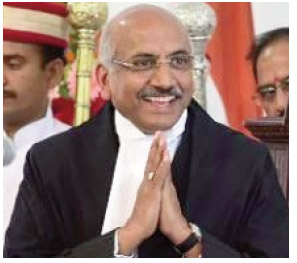 Hemant Gupta
Mishra moved a petition in the
Gwalior bench of Madhya Pradesh
High Court to obtain a stay order
against his disqualification. He was refused though the High Court agreed
to hear his petition. A petition on an
issue related to Mishra's
disqualification was moved by a
mysterious person in the main bench
of High Court at Jabalpur and Chief
Justice Hemant Gupta hastily
transferred Mishra's petition from
Gwalior bench to Jabalpur bench.
Rajendra Bharti, who had lost to
Mishra in the 2008 Assembly elections
and was the complainant to the
Election Commission about Mishra's
'paid news' activities, smelt a rat and
moved the Supreme Court and got
Mishra's petition transferred from
Madhya Pradesh High Court to Delhi
High Court where a single bench
refused to grant stay to Mishra. He
made an appeal before a division
bench of Delhi High Court but again
was denied a stay though the division
bench agreed to hear his petition in
August. Desperate to get a stay, Mishra
had moved Supreme Court at the time
of writing.
Hemant Gupta
Mishra moved a petition in the
Gwalior bench of Madhya Pradesh
High Court to obtain a stay order
against his disqualification. He was refused though the High Court agreed
to hear his petition. A petition on an
issue related to Mishra's
disqualification was moved by a
mysterious person in the main bench
of High Court at Jabalpur and Chief
Justice Hemant Gupta hastily
transferred Mishra's petition from
Gwalior bench to Jabalpur bench.
Rajendra Bharti, who had lost to
Mishra in the 2008 Assembly elections
and was the complainant to the
Election Commission about Mishra's
'paid news' activities, smelt a rat and
moved the Supreme Court and got
Mishra's petition transferred from
Madhya Pradesh High Court to Delhi
High Court where a single bench
refused to grant stay to Mishra. He
made an appeal before a division
bench of Delhi High Court but again
was denied a stay though the division
bench agreed to hear his petition in
August. Desperate to get a stay, Mishra
had moved Supreme Court at the time
of writing.




 N D Sharma
N D Sharma Anoop Mishra
Anoop Mishra Shivraj Singh Chouhan and Narottam Mishra
Shivraj Singh Chouhan and Narottam Mishra Ajay Vishnoi
Ajay Vishnoi Medha Patkar
Medha Patkar Chief Election Commissioner Nasim Zaidi along with Election
Commissioners O P Rawat (R) and A K Joti
Chief Election Commissioner Nasim Zaidi along with Election
Commissioners O P Rawat (R) and A K Joti Hemant Gupta
Hemant Gupta